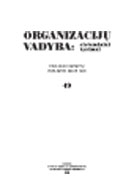Organizacijų kultūra ir jos vertinimo modeliavimas
ORGANIZATIONAL CULTURE, ITS MODELLING AND INFLUENCE ON COMPETITIVENESS
Author(s): Česlovas PurlysSubject(s): Economy
Published by: Vytauto Didžiojo Universitetas
Keywords: konkurencingumas; organizacijų kultūra; organizacijų kultūros elementai; vertinimas; modelis; organizational culture; elements of culture; factors influencing organizational culture; model of organizational culture; competitiveness
Summary/Abstract: The variety of scientific books and articles published on the subject of organizational culture does not terminate the problem: still remain unsolved problems of the essence and the main elements of organizational culture, the dynamics of its main factors and influence of segregated cultural elements on the success of the organization. Organizational culture is the model of keystone assurances discovered and developed by people solving the problems concerned with necessity to survive and win in the highly competitive environment. Many authors consider organizational culture as an effective method to realize and solve the problems of the organization. The research is based on the logic analysis of scientific literature, statistical data and questionnaire submitted to 60 enterprises in Lithuania. Sectors covered by investigation were trade – 30.6 % of all respondents, service – 35.5 %, logistics -14.5 %, production, – 4.1% medicine - 8.1 %, information – 6.5 %. The Assessment of organizational culture’s elements of investigated organizations was provided in 5 point scale of which 1 is not important absolutely, and 5 – very important. In 34.2 % of responding organizations compliance of norms of behavior were not important element, loyalty to management were important for 36.8 %, though as very important has named only 13,2 % respondents. This shows that in organizations many employees feel free to act and influence actions of management. 34.7 % of respondents think that managers only partly influence established norms of behavior and that they just execute maintenance function. Meeting clients needs as very important element has been mentioned by 39.5 % of respondents, and was no one that estimated the element of no importance. 34.4 %, respondents mentioned compensation system as fair, 13.6 % that it reflect embedded efforts, 7.4 % that wages are not suitable. Communication with clients as important element mentioned 36.8 %, and communication with colleagues was not important only for 18 %. The research distinguished the problems connected with the fact that the organizational culture is not discussed widely by the different forms of mass media in Lithuania, as well as in scientific literature, and even at the university campus. Attention though is paid mainly for product quality and satisfaction of clients needs. The investigation showed that culture of the organization is a powerful management instrument and as a complex phenomenon it must be assessed using a combination of tools and techniques. The author provides the selection technique of the most important elements of organizational culture and the mathematical model for assessment of the level of organizational culture.
Journal: Organizacijų vadyba: sisteminiai tyrimai
- Issue Year: 2009
- Issue No: 49
- Page Range: 97-108
- Page Count: 12
- Language: Lithuanian

